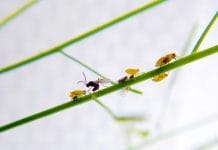Porcine reproductive and respiratory syndrome virus (PRRSV), a disease that reared its head in the 1980s and has been the bane of both pigs and their farmers on a global scale ever since. Most vaccines have failed to cease the spread of the virus in which it continues to evolve rapidly. In addition to causing respiratory related illnesses, miscarriage and death among pigs, PRRSV infection is the causative agent of major economic losses to the world-wide swine industry. To curb this predicament, scientists are currently developing pigs that are resistant to PRRSV using CRISPR-Cas9 gene editing technology.
CRISPR-Cas9 is a gene editing tool that enables scientists to perform alteration to parts of the genome. Initially discovered as a part of immune system for prokaryotic cells, CRISPR-Cas9 has been altered to edit genomes. It has stirred up excitement in the research community as CRISPR-Cas9 enables modification of gene function at a rapid pace in comparison to older methods of gene editing.
A team of researchers from the University of Edinburgh and biotech company, Genus have used the genome-editing tool CRISPRCas9 to incise a small section of the CD163 gene in the DNA code of swine.

















